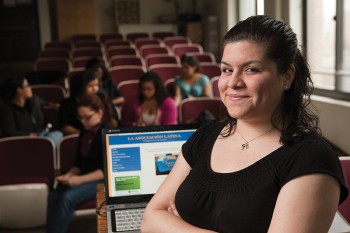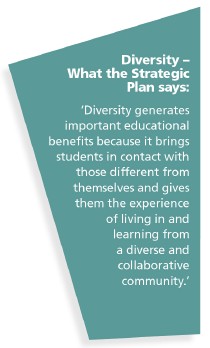COVER STORY SIDEBAR


Sherina Giler '10 See larger image
Sherina Giler '10 always knew she wanted to teach. But she didn't know -- until she came to Cornell -- that she also wanted to be a Latina leader who makes an impact. Now that she has graduated, she wants to ensure that "the students after us get the academic education and support they need."
A human development major in the College of Human Ecology with a concentration in social and personality development and minors in Latino studies and education, Giler in her first year worked in the Cornell Early Childhood Program. She loved the coursework and hands-on approach the college offered.
Over the next two summers, she taught in New York City in the Breakthrough New York at the Town School (formerly known as "Summer Bridge"), a year-round enrichment program that prepares middle school students with limited educational opportunities for college-preparatory high schools.
"I fell in love with the kids and the curriculum," Giler says. "As a Latina teaching science, I became a role model for the girls. At home I had been taught that if you open your mind to something, you can do it. Everything worth something in life is worth fighting for. That is what I tried to instill in these kids." The students were proudest when their grades had improved by the last exam, she says: "They knew that they could do it, and I knew that I could be a leader and have an impact."
Back at Cornell, Giler used her leadership skills in co-chairing La Asociación Latina, which oversees Cornell's Latino cultural, political, pre-professional and Greek organizations. "Last fall we held the first ever Latino leadership retreat," Giler says.
Giler also speaks with pride about her membership in Lambda Theta Alpha Latin Sorority Inc., which gave her a "safe space."
"Growing up and teaching in the inner city -- where if you are black or Latina, you are in the majority -- is different than being at Cornell, where you are a minority," she says.
Giler would like to see funding for Latino student organizations, the Latino Living Center and the Latino Studies Program remain constant or increase, even in times of financial constraint. She also cautions against consolidating various diverse groups and programs: "Black, Asian, Latino, Jewish, LGBT -- we all have different concerns. Even as Latinos, we are not all the same; we all come from different countries with different backgrounds."
Giler believes that diverse groups could benefit with additional advisers and faculty members who advocate for them. She hopes that Cornell will devote additional resources, mentors and counselors to support diverse students after they arrive: "Students who start at Cornell should be able to finish in four years," she says.
Giler hopes to teach in a charter school in New York while pursuing a master's degree in education. She expects to continue to work on behalf of the Cornell Latino community, even if it's just by designating her gifts to Latino programming. "I have very high hopes for Cornell," says Giler. "I'm willing to help on the alumni side to make it happen."
